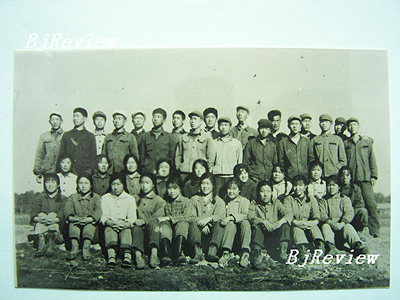| 
In the 1950s and 1960s, answering the call of duty, tens of thousands of urban youth flocked to a wilderness in northeast China called Beidahuang. They were carrying out what they saw as their duty, to make this deserted area into "China's grain barn" in order to solve food shortages at the time.
Large numbers of these urban youths were forced to drop out of school due to the disastrous Cultural Revolution (1966-76). They mostly came from six regions and numbered around 450,000. These young volunteers spent their adolescence opening up a wasteland and earned them the name Zhiqing, literally meaning young intellectuals. They made an unforgettable contribution to China's history and toward helping their fellow citizens.
Labor models
It was August 8,1968, when 17-year-old middle school student Qu Yajuan together with 52 other students took an eight-hour train to a farm in Heilongjiang Province, answering the call of their country, to toughen themselves up.
"I feel I'm like a soldier," said Qu, proudly as she put on a yellow military-type coat. But her dream was soon snuffed out when she arrived at her destination: an old farm, with shabby houses, poor accommodation, no heating, and wind pouring in through the cracks in the wall.
The volunteers' youthful enthusiasm was tainted by frustration as they had never lived without the shelter of their parents and had never found themselves engaged in hard labor building a dam.
The following year, Qu's fate changed as a result of an accident, when she lost her right hand to a mower at work. She was the 14th volunteer to be hurt during work, but not the worst injured: someone else had lost a whole arm.
Qu thought more about her future than the wound. The day after surgery she was back at work, and she soon began to train herself to write with her left hand.
The story of Qu's struggle with misfortune began to spread and she became a famous model worker. On the National Day of 1969, Qu was invited to Beijing to mount the Tiananmen Rostrum and see Chairman Mao.
Back from her Beijing trip Qu became even more busy than usual giving lectures about her exciting experience of seeing the country's greatest leader. Her change of fortune did not end there. In 1971, Qu became a member of the Heilongjiang Provincial Party Committee, at the age of less than 20.
"I was like a big star at that time," she recalled, but Qu remained calm despite the recognition. "I haven't made that much contribution," said Qu, adding that she was just the right person chosen as an object of propaganda at the time.
In 1972, the colleges reopened their gates to these young people. Qu was enrolled in Heilongjiang University and majored in philosophy. The philosophy department was coined the "cadre department" as most of the students there were young Party cadres like Qu.
"To be honest, I failed to learn things at the college. I can't even tutor my grandson's middle school lessons now," Qu said, also confessing that she often missed classes as she was so occupied with frequent political meetings.
Qu returned to the place she had once worked and became vice president of a local agricultural technical school. Later she married another Zhiqing and had a baby the next year, before returning to Harbin to live with her husband.
| 